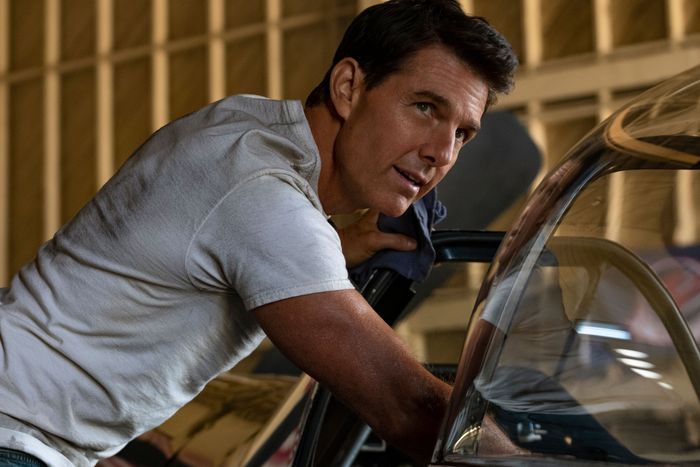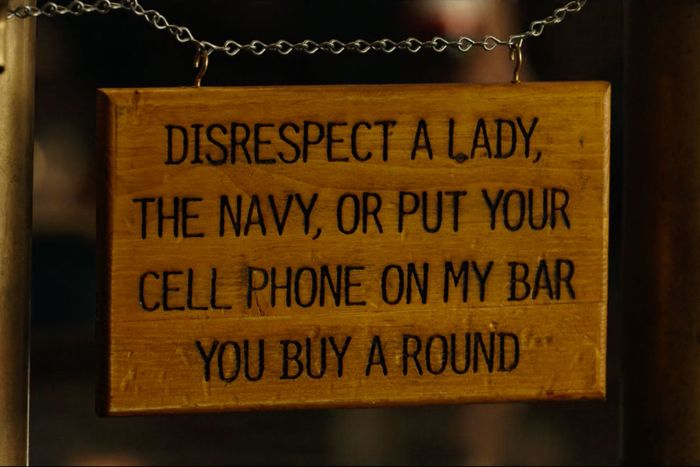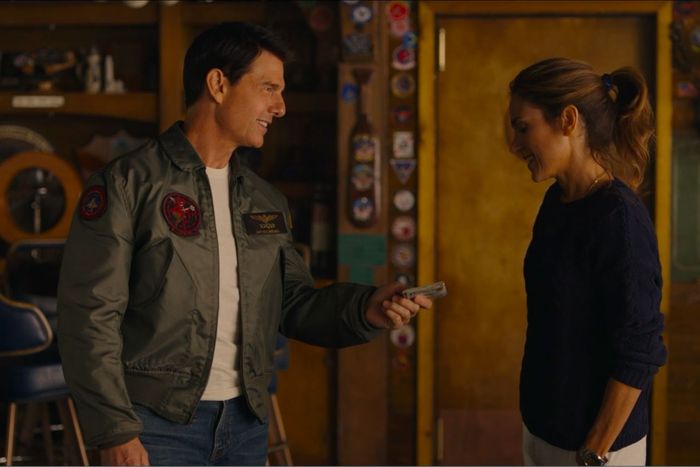
A lot happens in Top Gun: Maverick that might take your breath away. After finally watching the biggest movie of the year, though, I could think of one thing only: the weird rule about phones in that bar. What was up with that?
A quick recap: Upon returning to Top Gun, Maverick (Tom Cruise) stops at a Navy bar and watches a very normal game of darts in which one player covers the others eyes. But Maverick cant believe his eyes when he spies his old flame Penny (Jennifer Connelly) working behind the counter. Just as sparks appear on the verge of rekindling, the two agree to keep things platonic. Penny then celebrates their arrangement by ringing a bell to let everybody in the place know Maverick is buying the entire bar a round  because he put his phone on the counter  which is against the rules  which he should know because theyre listed on a tiny sign.
Right away, people start thanking and dunking on Maverick, including a tanned Adonis played by Glen Powell who orders ÔÇ£four more on the old-timer.ÔÇØ It all seems like a put-on at first, but then Penny actually holds MaverickÔÇÖs feet to the money-fire. I canÔÇÖt stress enough that he is smiling this entire time as if this is all just another classic Maverick aggressive bar flirtation.
When Maverick tries to pay the enormous bar tab, his credit card gets declined, and Penny wonÔÇÖt accept the cash in his pocket as an advance.
ÔÇ£IÔÇÖm afraid rules are rules,ÔÇØ she says, ringing the bell once more, causing everybody at the bar to chant ÔÇ£Overboard! Overboard!ÔÇØ as a trio of yoked fighter pilots materialize behind our Maverick and throw him out of the bar like three Uncles Phil tossing out Jazz.
Once excommunicated, Maverick realizes Rooster (Miles Teller), the son of his famously dead former wingman, Goose (Anthony Edwards), has been playing piano in the bar this whole time. Maverick is now lost in painful memories of their complicated history. Penny notices him moping through the window, and it is strongly implied that she correctly intuits the cause of his sudden sadness ÔÇö┬ánot that he might be sad because he just lost untold hundreds of dollars and got clowned on with extreme prejudice merely for texting Iceman (Val Kilmer).
The movie hasnÔÇÖt even begun to cook yet, but throughout all the awesome sky action to come, I remained fixated on that phone rule. Why would the rule be so rigidly enforced? Are viewers supposed to applaud the rule, even though it smacks of boomerish disdain for these darn millennials and their dang phones? How often would the rule have to be violated before everyone at the bar knew what each specific ding of the bell means? And why are they all so excited, anyway ÔÇö┬ádonÔÇÖt they worry someone they care about might be next? Oh, and most important of all: Why does a sequel to the cinematic apex of American patriotism apparently hate freedom?
Refusing to let the matter drop after the credits, I searched high and low for answers.
It turns out this bar is inspired by a real place: the World Famous I-Bar, located at Naval Station North Island in Southern California. Reportedly, I-Bar has been a cherished Navy hangout since the 1930s, and it does indeed have a rule against putting cell phones down on the counter along with several other rules that also penalty out to ÔÇ£buying a round of cheer.ÔÇØ
But if the filmmakers thought they were weaving in The Bear-like authenticity with this phone rule, they were sorely mistaken.
I asked my Marine father-in-law about the rules at I-Bar ÔÇö┬áincidentally, this was the first time having a Marine father-in-law proved more helpful than terrifying ÔÇö┬áand his face lit up. Hearing about the I-BarÔÇÖs rule against wearing uniform hats inside took him right back to the days when he might have had a drink in such a place. The no-hat rule is a well-known tradition, as he recalls. His Marine days ended before cell phones were everywhere, though, so he couldnÔÇÖt weigh in on that rule.
None of this helped me better understand why people at a bar would enjoy ejecting customers, let alone going it about as roughly as Goose getting ejected from that jet. All over a silly rule on a little sign! To find out, I got in touch with the Jennifer Connelly equivalent at the I-Bar ÔÇö┬áa woman named Debbie Stoneman, who has worked there for 22 years.
The phone rule started many years ago, according to Stoneman, when an admiral came to I-Bar and was dismayed to see so many eyes glued to so many phones. It sort of took the place of a previous rule that if anyone called the bar looking for their husband, the bartender rang a bell and the husband had to buy everyone a beer.
Buying a round is not as bad as it seems in the movie, though. The real bar is much smaller than the one in Top Gun, and drinks are only $6.50, so the average round is about $70. In fact, the largest tab Stoneman remembers anyone paying for a round ever was a couple hundred bucks ÔÇö┬áa relatively paltry sum compared with whatever Maverick pays when he returns the next day.
If people tend to be good sports about buying a round, as Stoneman claims, itÔÇÖs probably because they were aptly warned first. Following the phenomenon of Top Gun: Maverick, I-Bar has posted signs with the house rules near the front and back doors, making them nearly impossible to miss. Some of the many recent visitors ÔÇö┬ácivilians are welcome, but they need a military escort to get on base ÔÇö even break the rules intentionally just to live out their Top Gun fantasies.
But what happens when people arenÔÇÖt such good sports about buying a round?
Absolutely nothing.
ÔÇ£We canÔÇÖt make anybody buy a round,ÔÇØ Stoneman says. ÔÇ£ItÔÇÖs just a suggested thing only.ÔÇØ
With this last revelation, everything makes sense. Of course the real-life bar hasnÔÇÖt trained its patrons to enforce and celebrate expelling the noncompliant. That would be a hostile, legally sketchy, and downright un-American thing to do.
I reached out to Top Gun: Maverick screenwriter Christopher McQuarrie to find out how this dramatization came about, but he was ÔÇ£too busyÔÇØ to respond to my questions. Perhaps itÔÇÖs because he is currently in Europe, directing the next two Mission: Impossible movies; perhaps itÔÇÖs because heÔÇÖs afraid of the truth. Little does he know, however, that I have a tiny sign on my desk clearly stating that any creatives who donÔÇÖt respond to my questions have to buy me a Jersey MikeÔÇÖs sub ÔÇö┬áand unlike the rules at I-Bar, it is not just a suggested thing only.
More From This Series
- Can Timoth├®e Chalamet Sing? We Have the Receipts
- Who Are the Thirsty Celebrities on The Masked Singer?
- Is Landman Funny?



